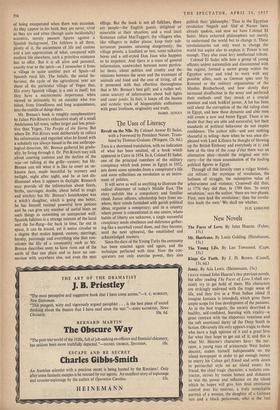The Uses of Literacy
Revolt on the Nile. By Colonel Anwar El Sadat, with a Foreword by President Nasser. Trans- lated by Thomas Graham. (Wingate, 12s. 6d.) THIS is a shortened translation, with no indication of what has been omitted, of a book which appeared in Cairo in 1954. In it, Colonel El Sadat, one of the principal members of the military conspiracy which took power in Egypt in 1952, sets down some episodes from a conspirator's life and some reflections on revolution as an instru- ment of politics.
It will serve as well as anything to illustrate the radical distemper of today's Middle East. The story unfolds like a compulsory and familiar ritual. Junior officers, scholarship boys from no- where, their minds furnished with garish political ideas, organise a conspiracy; and in a country where power is concentrated in one centre, where habits of liberty are unknown, a single successful conspiracy sends obedience and deference gather- ing like a snowball round them, and they become, until the next upheaval, the established and acknowledged masters.
Since the days of the Young Turks the ceremony has been enacted again and again, and the technique perfected with time. Now the con- spirators not only exercise power, they also publish their 'philosophy.' Thus in the Egyptian revolution Neguib and Abd el Nasser have already spoken, and now we have Colonel El Sadat. Marx exhorted philosophers not merely to understand the world but to change it. These revolutionaries not only want to change the world but aspire also to explain it. Power is not enough. They also must levy intellectual tribute.
Colonel El Sadat tells how a group of young officers, ardent nationalists and discontented with the regime, formed a secret group within the Egyptian army and tried to work with any possible allies, such as German spies sent by Rommel or the military organisation of the Muslim Brotherhood, and how slowly they increased disaffection in the army and perfected their methods until they struck at a crucial moment and took hold of power. A lot has been said about the corruption of the old ruling class in Egypt, and how these dynamic and able men will create a new and better Egypt. There is no doubt that they are able and successful; but their standards of political behaviour do not inspire confidence. The author tells—and sees nothing shameful in telling—how when he was once dis- pleased with Lord Killearn he thought of blowing up the British Embassy and everybody in it; and how at the time of the coup d'etat there was an alternative plan—should the original one mis- carry—for the mass assassination of the leading political figures in Egypt.
Through all this ferocity runs a vulgar histori- cist refrain : the mystique of revolution, the holiness of struggle, the redemptive value of arbitrariness and violence; Cromwell did thus, in 1776 they did thus, in 1789 thus. 'In every revolution,' says the author. 'there are two phases. First, men lead the revolution : then the revolu- tion leads the men.' We shall see whither.
ELIE KEDOURIE






























 Previous page
Previous page